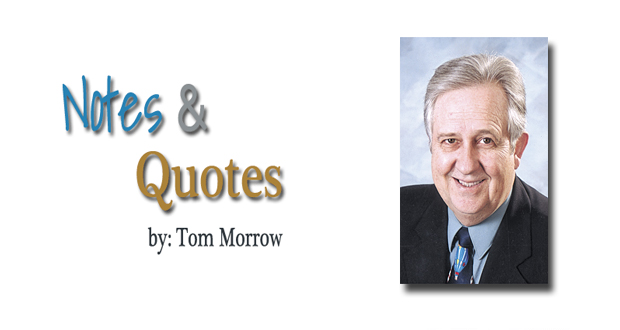A character most unforgettable
By Tom Morrow
In my “Most Unforgettable Character” list, the late Fred Swearengen of Carlsbad had all of the qualifications to hold that title.
During World War II action in the Pacific, Navy dive bomber pilot Swearengen held the Navy Cross, the highest battle honor of the Navy. He also, was awarded four Distinguished Flying Crosses, and four Air Medals
.”You got an Air Medal for every five times you flew against the enemy,” Fred told me a few years back. “I guess the Navy figured if you survived that many flights, you deserved it. Hell, if you got to chow on time, the Navy recommended you for a medal.”
During the war, Fred was stationed aboard Vice Adm. Marc Mitscher’s carrier flagship, the USS Bunker Hill. He was trained as a dive bomber pilot at North Island Naval Air Station and, because of the war time shortage of accommodations, he was berthed at the nearby historic Hotel del Coronado.
“When not flying (at sea), pilots would gather in the ready room and play cards. If there was an attack, we’d just keep right on playing, but when those 20 millimeter shipboard guns starting firing, we’d usually stop because that meant the enemy was getting damned close.”
Fred recalled the time the Officer of the Day came in the ready room for some pilots to move 10 planes forward on the flight deck so that an incoming squadron could land.
“I tried to get out of the detail by hiding behind a big high-backed chair, but I got caught and the O.O.D. ordered me to go topside and move planes.”
Fred said when he got up on the flight deck, a Japanese kamakazi plane came straight out of nowhere, slamming into the Bunker Hill. Everyone left in the ready room where Fred had been just 10 minutes before was killed in an exploding ball of fire. Another kamakazi hit about 20 seconds later. In all, 400 sailors were killed, with 700 to 800 wounded. The Bunker Hill was lost.
In civilian life, Fred spent 21 years officiating for the National Football League between 1960 and 1981. He officiated Super Bowls III and XIII, but he’ll be most remembered by sports fans for making the call that became a legend in football history — “the immaculate reception” by Pittsburgh Steeler running back Franco Harris when they played the Oakland Raiders.
“Because of that call, my name is boldly written on every crapper wall in Oakland. (Then) Oakland Raiders head coach John Madden HAS never forgiven me.”
We lost Fred last year, but what a character we had while he was in our midst.
WWII ACRONYMS – Of all the G.I. verbiage created during World War II, there were two or three that became prominently known through the Allied Forces: “SNAFU” and “FUBAR,” and to a lesser extent: “SUSFU.”
Troops and Sailors used these phrases from the lowest of enlisted to the highest commanders. It is believed to have started by the U.S. Marines.
Earliest use of the acronym appeared at the beginning of the war. Editors used SNAFU in a September 1941 issue of “American Notes and Queries.” That same month, Time magazine used the term in the June 16, 1941 issue: “Last week U.S. citizens knew that gasoline rationing and rubber requisitioning were SNAFU.”
Keep in mind when you get a group of service personnel, especially males, they can come up with some rather creative lingo. “SNAFU” became so prominently used that today it has become common place in our everyday commentary. It’s been used by radio and television commentators, but if they knew what it actually meant, they might take pause.
Most reference works, including the Oxford English and Random House Unabridged dictionaries place the origin date of SNAFU in the early 1940s, generally attributing it to the U.S. Marine Corps. FUBAR came later during the chaotic days of WWII.
The acronym “SNAFU” was originally used to sum up particular chaotic situations, especially when referring to military strategy or unclear commands. “SNAFU” means “Situation Normal: All F***** Up.” It became so common place that a G.I. comic strip was titled “Private SNAFU.”
The lesser-used of the two, but still understood on all Allied fronts was “FUBAR.” It doesn’t take much imagination to decipher: “F***** Up Beyond All Recognition.” It too can be found in most dictionaries. But the two acronyms aren’t alone. A lesser-used one is “SUSFU” – “Situation Unchanged: Still FXXX Up.” It was (and still is) used by the military as well as in the civilian business world.




